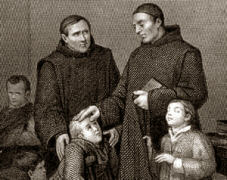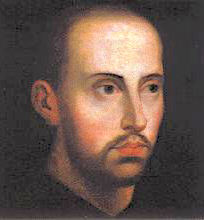Lent: March 8th
Friday of the Third Week of Lent; Optional Memorial of St. John of God, Religious
» Enjoy our Liturgical Seasons series of e-books!
Good Friday is three weeks away. The conflict between Jesus and the religious leaders of his time continues to intensify as the Third Week of Lent draws to an end. In today’s gospel reading, one of the Temple scribes gives Jesus an orthodoxy check, asking him to name the greatest of the Commandments. The answer given (love of God and love of neighbor) suffices to end that line of theological attack on the unexpected Galilean preacher and miracle-worker: “And after that, no one dared to ask him any questions.” But the conflict will grow sharper in the weeks ahead. —George Weigel, Roman Pilgrimage: The Station Churches
Today is the Optional Memorial of St. John of God (1495-1550), who was of Portuguese descent, was first a shepherd, a book dealer and then a soldier. At the age of forty he was converted, and devoted himself to the care of those sick in mind, showing himself in this thankless task to be a true innovator and a saint of super-human heroism. He founded the Order of the Brothers Hospitallers, which bears his name. He died at Granada in 1550. Pope Leo XIII declared him Patron of Hospitals and Patron of the Sick and commanded his name to be placed in the Litanies of the Dying. "God is love! Whoever abides in love; abides in God and God in him" (motto of St. John's community).
Meditation—Precious to God
If we attend to the passion of Christ we hear a voice insisting 'Someone died for you.' And of that someone dying it can with all truth be said that God is there, bearing the burden of our wrongdoing, the burden of our pain, loneliness and death. God is there loving us totally, holding back nothing. And because He died for us and lived for us, our lives in all their trivialities, their joys and burdens, have meaning in Him. They hold Him within them, through them we can surrender to Him.
How precious we must be to God! How momentous our life span! Yet we value ourselves so lightly, waste the precious content of our being, never reach fulfillment. We do not really live but allow life to pass us by.
God wants us to seize hold of life, hoard its unique opportunities for growth, grasps its chances to express our love and gratitude to Him who loved us first.
Every moment of our life can be filled with eternity, because at every moment, in every event and circumstance we can say or 'Yes' to God who wills us to live to capacity, wills us to act as full persons.
How many of us act from our inmost centre according to principles, not merely following the crowd, the line of least resistance, seeking immediate satisfactions and appreciation? Meanwhile the days and years pass by and we remain essentially undeveloped.
Yet Someone died for us that we might live with abundant life.
—Ruth Burrows, Through Him, With Him, In Him
St. John of God
In 1503, at the age of eight, John fled from his parents for some unknown reason. For a while he was a shepherd, then a book dealer. Matters spiritual were of no particular interest until he heard the preaching of Blessed John of Avila. Then his conversion was so sincere and sudden that he was considered to be out of his mind. He was incarcerated in the Royal Hospital in Granada, and suffered the cruel treatment of the day. Here he discovered how to show his love for God, through caring for those who were unable to respond to this cruel treatment. He resolved to devote the remainder of his life caring for people living on the margins of society.
Following John’s death on his 55th birthday, March 8th, his helpers banded together to live in the same radical, spiritual way of Hospitality that John had exemplified and in 1572 they were approved by Pius V, as the Hospitaller Brothers of (St) John of God. The members bind themselves by a fourth vow, the service of the sick. Because of his work our saint has become the patron of hospitals and the dying. His name is in the Litany of the Dying.
—From St. John's Life by Bihlmeyer
 On July 3, 1549, a fire broke out in the kitchen of the Royal hospital at Granada that had been founded by the Spanish king and queen, Ferdinand and Isabella. It threatened to spread to the large wards where hundreds of sick were lying. The storm and fire bells rang loudly. People rushed from all sides, John in the lead. The fire was beyond control, firemen and volunteers were unable to extinguish it. No one dared to enter the burning building from which came the pitiful cries of the sick in the agony of imminent and certain death. Fire and smoke choked the exits. Those who could still arise from their beds stood pleading at the windows. The scene was enough to drive a person insane.
On July 3, 1549, a fire broke out in the kitchen of the Royal hospital at Granada that had been founded by the Spanish king and queen, Ferdinand and Isabella. It threatened to spread to the large wards where hundreds of sick were lying. The storm and fire bells rang loudly. People rushed from all sides, John in the lead. The fire was beyond control, firemen and volunteers were unable to extinguish it. No one dared to enter the burning building from which came the pitiful cries of the sick in the agony of imminent and certain death. Fire and smoke choked the exits. Those who could still arise from their beds stood pleading at the windows. The scene was enough to drive a person insane.
John could not stand idly by. Disregarding smoke and flame, he rushed in among the sick, opened doors and windows, gave terse orders and directions as to how they who could might save themselves; some he led, others he dragged or carried into the open, often two at a time. When all the bedridden were safe, he wasted no time in throwing coverlets, bed clothing, chairs and other valuables out of the windows, thus saving the property of the poor.
Then he took an axe, climbed to the roof and began chopping away vigorously. Suddenly the liberated flames leapt up high beside him. He fled, only to continue his heroic work in another part of the building. There too a wave of fire soon stopped him. He was standing literally between two infernos. Moments passed, he was lost in the heat of the flames and the choking smoke. A quarter of an hour—loud cries of fear could be heard for the brave man—and then he sprang from the fire, blackened by smoke but unscathed except for singed eyebrows. Joyously the crowd surrounded him, congratulating the savior of the sick. John's modesty, however, prevented him from accepting praise and honors.
—Excerpted from The Church's Year of Grace, Pius Parsch
Patronage: against alcoholism; against bodily ills; against sickness; alcoholics; bookbinders; booksellers; dying people; firefighters; heart patients; hospitals (proclaimed on 22 June 1886 by Pope Leo XIII); hospital workers; nurses (proclaimed in 1930 by Pope Pius XI); publishers; printers; sick people; Tultepec, Mexico; Montemor-o-Novo, Portugal
Symbols and Representation: The pomegranate—the fruit which represents charity and love, in the Bible, is the coat of arms of the Hospitaller Order and its motto is “God is Love”. John is depicted in art washing the feet of Jesus. A famous painting by Gomez-Moreno 1880 depicts John rescuing the patients from the inferno at the Royal Hospital (where he himself had been a patient 10 years earlier) where not even one life was lost. Also: alms; alms box around his neck; cord; crown of thorns; heart; rope
Highlights and Things to Do:
- Read more about St. John of God:
- Find out more about the Order of Hospitality of St. John of God.
- St. John of God remains are in a silver urn within the gilded Baroque altarpiece above the main altar in the Basílica de San Juan de Dios or Basilica of St. John of God in Granada, Spain.
- See the statue of St. John of God in St. Peter's Basilica.
- St. John of God followed his impulses when it came to serving Christ. He never reconsidered or second-guessed the inspirations of the Holy Spirit, but he acted on them instantly, whether or not they seemed practical. Today follow God's will immediately as it is manifested to you.
- St. John of God never thought of himself but always reached out to others. Examine your conscience tonight and ask yourself: do I habitually give greater importance to others' needs before my own? Do I esteem myself over-highly, or do I consider myself of least importance?
- It is often overlooked in present-day hospital methods that characterized the age-old practice of the Church, viz., a harmonious, organic relationship between liturgy and care of the sick. Pray the Litany of the Sick for those hospitalized, and also the intention that hospital care will incorporate the Christian dimension and respect each person as an image of God.






